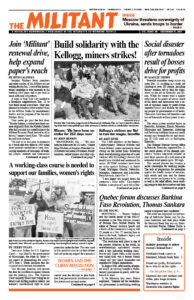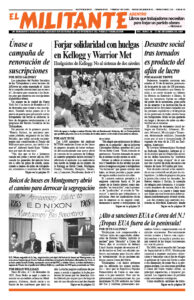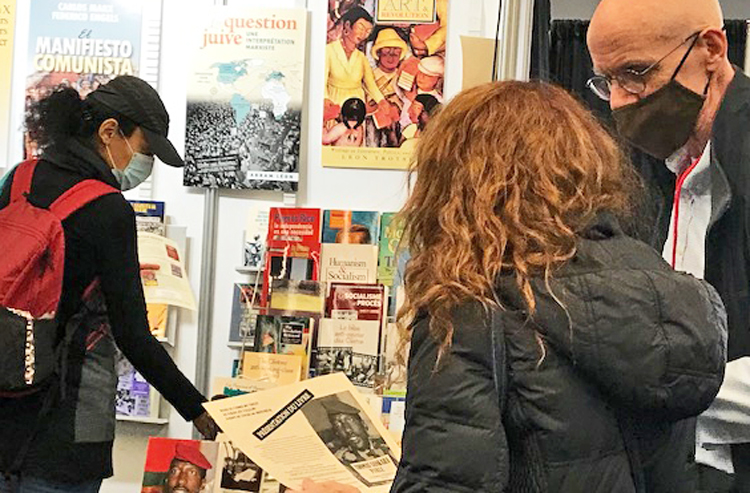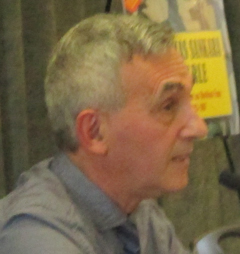MONTREAL — Thomas Sankara was the central leader of the 1983-87 revolution in the West African country of Burkina Faso, Michel Prairie, the editor of Thomas Sankara Speaks and a leader of the Communist League, told 25 people at a Nov. 27 meeting here to discuss the book, Sankara’s legacy and the Burkinabe Revolution.
“The revolution took place in one of the poorest countries in the world, an overwhelmingly agricultural country with a tiny industrial working class,” Prairie said. Upper Volta, as the country was called then, was a former French colony still very much dominated and exploited by French imperialism.
In August 1983, after months of popular unrest, an uprising brought a revolutionary government to power, with Sankara at its head.
In the following four years, Prairie explained, “Sankara led the revolutionary government in mobilizing working people to improve their conditions.”
The event was organized in a partnership of Pathfinder Books and the Racines bookstore, and took place while the Montreal Book Fair was on. Panelists included Prairie; Tidiane Diallo, a refugee-rights activist from Guinea; and Emmanuel Adigun, who read a statement from Kenneth Adetola, a West African political refugee scheduled to speak but too ill to attend.
Published in 1988 in English and 2007 in French by Pathfinder Press, the book contains 30 speeches and interviews given by Sankara.
After the revolution came to power in a country facing hunger and ongoing encroachment of the Sahel desert, Sankara led workers and peasants to come together, Prairie said. They mobilized to build dams, irrigate valleys, plant trees and increase the production and distribution of food.
The revolutionary government organized massive literacy and immunization drives, he said. It nationalized the land and mobilized peasants to confront centuries-old exploitative relations in the countryside.
Sankara also took demonstrative steps toward involving women in the revolution and educating working people on the need to combat women’s oppression. One key speech in the book is “The Revolution Cannot Triumph Without the Emancipation of Women.”
“Sankara was an internationalist,” Prairie said. The Burkina Faso Revolution fought imperialist domination and extended solidarity to other peoples fighting for their rights.
“What distinguishes Sankara among other revolutionaries who led courageous struggles against colonial and imperialist domination in Africa,” he added, “is that he was a revolutionary Marxist, a communist. He had total confidence in the capacity of workers and peasants to transform their lives and become new human beings with new proletarian values in the process.
“It is not an accident that the revolution forged links with the Cuban Revolution, and that Cuba sent 450 volunteers to help.
“Sankara explained,” said Prairie, “that the revolution in Burkina Faso was a popular and democratic one. Its task was not to expropriate the capitalists and open the road to socialism. The country was too underdeveloped economically and socially. The revolution’s task was to mobilize working people in solving their most immediate needs and, in so doing, create the conditions for the development of the country’s economy and of a modern working class.
“Sankara fought till his last day to press this revolutionary course, whatever the obstacles,” Prairie said.
‘Learned of Sankara from book’
“I was born two years after Sankara was killed,” Diallo told the meeting. “I really learned about him when I read Pathfinder’s collection of his speeches after coming to Canada as a political refugee.
“Sankara explained the fight for the trees and the forests is an anti-imperialist struggle because the imperialism is the arsonist of our forests and our plains,” he said. “Comrade Sankara also understood that within Burkinabe society there was a certain exploitation of one layer by another, the exploitation of women by men.
“I was struck how as a child, Sankara said he used to spend his days playing outdoors with other boys while his young sisters had to stay home helping their mother do the chores,” he said. “This was something the Burkina Faso Revolution addressed, organizing days when men had to go to the market in order to buy food for the family.
“Sankara said that the revolution needs a convinced, not a conquered people,” Diallo said. “There were some in the government who wanted to utilize force against the people, but comrade Sankara stressed the need for pedagogy.”
Adetola’s statement explained he was a student in Nigeria at the time of the Burkina Faso Revolution. “The accomplishments in the health sector under the Thomas Sankara-led government,” he said, “are impressive, giant strides that saw vaccination in just two weeks of over 2.5 million children.
“When he came to power, the literacy level in Burkina Faso was only 12%. By dint of hard work and determination, his government drove the level up to 22% in just under two years,” Adetola wrote. “You will notice his passion and zeal not only to educate the mind of his people, but also educate their hearts and rescue their consciousness from mental slavery.”
A revolution overthrown
In the discussion Prairie addressed Sankara’s fight in the last months of the revolution to build a revolutionary party, a party “that could regroup the best and most devoted fighters in order to lead the revolution forward, those involved with the peasants growing food and planting trees, not giving orders from an air-conditioned office in the capital city Ouagadougou.”
There was no such party in Burkina Faso that united all revolutionaries in its ranks. Many of those who agreed with Sankara’s course were either killed in the coup that overthrew the revolutionary government or broken by the decadeslong brutal repression under Blaise Compaore that followed.
Peter Thierjung, from the Socialist Workers Party in the U.S. who attended the meeting, took part in the discussion, addressing the current trial in Burkina Faso of 14 individuals, including Compaore, who are charged with being involved in the assassination of Sankara.
“For four years imperialism was unsuccessful in toppling the revolution from the outside because of Sankara’s leadership,” Thierjung said. “The counterrevolution came from inside, led by Compaore and his cronies who claimed to be revolutionaries but were not. They used thuggery, torture and murder to take power.
“Sankara’s political course and example are indispensable for working people in North America and other countries to read and study,” he said.
Maya Berger, a University of Montreal student, was one of three participants who had learned of the meeting from the Pathfinder Books booth at the Montreal Book Fair. In her opinion, the meeting and discussion, “clearly encouraged me that there are answers for workers’ struggles and liberation struggles today.”



